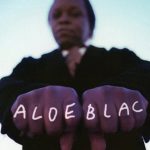Interview with Jeff Weiss of Los Angeles Times, published in latimesblogs.latimes.com
Though he’s frequently tagged as “the ambassador of Boogie,” Dam-Funk (pronounced: “Dame” as in his first name Damon) doesn’t make “boogie music” — the post-disco amalgam of funk, electro, New Wave and disco that lit up discotheques and roller rinks from Los Angeles to London throughout the early '80s. Not content to traffic in polite revisionism, the Pasadena-raised, Leimert Park-based Stones Throw artist describes his brand of chromatic tripped-out soul as “modern funk,” which is arguably the most accurate description of his syncretistic meld of P-Funk and Prince to drum machines and post-house groove.
Rest assured, if you catch Damon Riddick putting needles to wax at his fabled Funkmosphere Monday night residency at Carbon in Culver City, you’ll hear a host of obscure boogie (and funk and soul) 45s culled from his 5,000-plus record collection. But lately, the former session keyboard player for Westside Connection and MC Eight has been making waves for his own musical output — perhaps most notably a funkadelic remix of “Summertime Clothes,” from indie icons Animal Collective.
There’s been a revival of the boogie, post-disco and early electro sound in recent years. What do you think it is about the music that’s allowed it to sustain such longevity?
People just want funky bass lines and synthesizers in their listening experience, with really melodic chords. Over the years, dance-related urban culture got harder, with hip-hop’s influence being predominant, but as time goes around people want to hear interesting chords with the beats.
I was influenced a lot by Slave, Aurra, early Prince, anything on Prelude Records, the stuff that tended to get ignored once hip-hop came in, and crate-diggers started to look for harder, James Brown-type funk breaks. For a long time, the '80s sound was considered cheesy, and it’s nice to see it regaining credibility. At one time, it was deemed unlistenable. Now with the rise of Daft Punk and Kanye, everyone wants to do it.
How would you describe boogie music to someone unfamiliar with the genre?
First of all, the name was created in the United Kingdom by cats like Norman Jay in the 1980s, right before the Soul II Soul era of the late '80s. Most of it was put out on labels like Prelude and Brunswick Records — that West End-style soul. It’s a type of music that never fails to move a crowd. I think of it as post-disco, sandwiched in between funk and disco, not P-Funk but not the Bee Gees. Sometimes, it has the 4/4 beat and the 2/2. A song like “Bounce, Rock, Skate,” is a perfect example of a boogie song.
How did you end up hooking up with Animal Collective to remix “Summertime Clothes?”
Animal Collective’s manager reached out to me because the group wanted to collaborate with me. I dug their material and we agreed to do something. I studied their song, I didn’t just chop it up and put effects on it — I studied it hard, and shaped it around the vocal to take them to the dance floor, but still have something that you could ride around with your girl and listen to. I understood that the band’s fans are sensitive to the source material. It’s like Prince — if someone remixed Prince back in the day, I would’ve been waiting with baited breath.
I was pleased that the majority of people seemed to like it. When I saw Animal Collective at the Troubadour, one of them told me that he couldn’t stop listening to it on repeat, and that meant a lot to me. I really respect those dudes and wanted to get down with them. For lack of a better description, they sort of remind me of Talking Heads, how they were into expanding their sound and collaborating with George Clinton. I love that aspect of collaborating with different types of artists. Nite Jewel has become a good buddy of mine, because we like those same type of chords. No matter what type of genre, if it’s beautiful music, that’s what we’ll lean towards.
How does Toeachizown differ from the 12 inches and remixes that you’ve previously put out?
It’s my official debut full length and it’s been delayed a bit because I can’t stop recording new tracks. I’m trying to get it out before the year is over. It’s a modern funk project; boogie is what I spin out at the clubs. I’m not into doing boogie revival, I’m not trying to re-create old sounds, I consider it modern funk. There will be instrumentals, no samples, stuff with vocals, concept songs, some songs longer than 10 minutes. That’s why it’s called Toeachizown — you’re allowed to do whatever you want to do.
Right now, I’m focusing really hard on the album, playing my DJ gigs and doing the occasional remix. I really want to start doing movie scores, especially a horror movie. I’ve got a lot of ideas in my head about what sort of stuff I could do with it.
Peanut Butter Wolf says you have one of the most unique styles of recording he’s ever seen. What's your method for recording music?
Well, when I was a kid recording my music in a bedroom in Pasadena, I’d go tape deck to tape deck. I actually still have those early recordings and Peanut Butter Wolf is going to be putting them out soon on a Circle Star Records imprint he’s starting. But I always used a tape deck, never an eight track or a more serious recording process. I did it out of necessity, and used all analogue equipment and keyboards and drum machines.
Now I record from CD to CD. No Pro Tools, straight from Leimert Park in the Funkmosphere lab, no sequencers, no sampling. I play it all through from beginning to end. I’m not trying to be elitist or anything, that’s just always the way I’ve done it.
